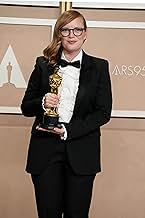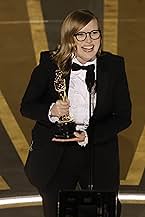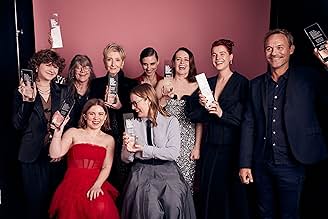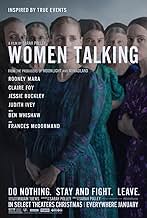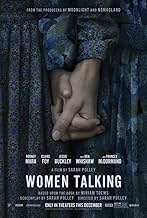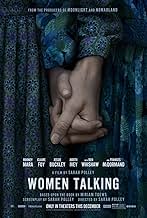Do nothing, stay and fight, or leave. In 2010, the women of an isolated religious community grapple with reconciling a brutal reality with their faith.Do nothing, stay and fight, or leave. In 2010, the women of an isolated religious community grapple with reconciling a brutal reality with their faith.Do nothing, stay and fight, or leave. In 2010, the women of an isolated religious community grapple with reconciling a brutal reality with their faith.
- Won 1 Oscar
- 65 wins & 164 nominations total
- Director
- Writers
- All cast & crew
- Production, box office & more at IMDbPro
Storyline
Did you know
- TriviaExplaining the color grading of the film, director Sarah Polley said the filmmakers played with saturation levels to create a feeling of "a world that had faded in the past." This is why the film appears to be almost black and white, but not quite.
- GoofsNettie identifies as a man name "Melvin". The Mennonite do not allow members to identify as anything other than their biological sex and gender. In real life, Nettie would have been excommunicated. There are over one hundred different Anabaptist (Amish, Brethren, Hutterite, Mennonite) church groups, counting more than 6,000 congregations, all holding to slightly different traditions and their own interpretations of the Bible. The movie never identified the Anabaptist group of the colony.
- SoundtracksDaydream Believer
Written by John Stewart
Performed by The Monkees
Courtesy of Rhino Entertainment Company
By arrangement with Warner Music Group Film & TV Licensing
Featured review
It's an ensemble drama set within 24 hours in 2010 in an unknown location. It follows the conversation of three generations of women discussing how to respond to the sexual abuse and rape experienced by many women in the colony over the previous years.
The conversation occurs while the colony's men are away in the city, raising bail for colony men arrested for sexual crimes. Eight women participate in most of the discussion. Two grandmother matriarchs are Agata (Judith Ivey) and Greta (Sheila McCarthy). The next generation includes Ona (Rooney Mara), an unmarried woman pregnant with a child resulting from rape. Mariche (Jessie Buckley) is married to a very abusive husband. Salome (Clare Foy) is Ona's younger married sister who is very angry over the abuse of her young daughter. Some girls from the next generation provide comments and some narration to the film. Scarface Janz (Frances McDormand), another matriarch, leaves the discussion early. Since the women are illiterate (only boys go to school), they ask the schoolteacher, August (Ben Whishaw), to record their discussion. August, who had left the colony with his mother, was university-educated but was allowed to return to teach school.
The film shows no sexual violence but does show some results of the violence. The only adult male face seen throughout is that of August. The women discuss three options: staying and forgiving the perpetrators, staying and fighting the perpetrators, or leaving with all the children under a certain age. They must make a quick decision because one of the men is returning from the city in the evening. The decision taken by the group is a very "Mennonite" one.
I had a lot of ambivalence going into the film. I didn't like the novel when I read it several years ago. The author closely tied the story to accounts of crimes in one of Bolivia's very conservative Mennonite groups. However, the novel's nuanced dialogue was far beyond illiterate Mennonite women without education who could not even read a map. And a university-educated August would never be allowed back to teach in such a conservative colony.
Sarah Polley extracts the story from Mennonite specificity (the film never mentions the word and doesn't mention "Mennonite" last names). Polley uses very subdued colors in the filming, reinforcing the conservative impression. Although the movie's setting still looks Mennonite, its greater abstraction allowed me to focus on the issues being discussed--rage, forced ignorance, the necessity of faith and how to reconcile this faith with what happened, how best to embody their pacifist ethic, etc. The discussion is wide-ranging and doesn't provide easy and ready solutions. Rooney Mara, Claire Foy, and Jessie Buckley are excellent as they express contrasting and shifting perspectives.
"Women Talking" probably needs to be seen multiple times to get all the layers. The Mennonite context sells the movie, but for me, it only made sense to push that representation to the rear. I wish critics would focus on it less. The film's ending unfolds a little too slowly once their decision has been made.
The conversation occurs while the colony's men are away in the city, raising bail for colony men arrested for sexual crimes. Eight women participate in most of the discussion. Two grandmother matriarchs are Agata (Judith Ivey) and Greta (Sheila McCarthy). The next generation includes Ona (Rooney Mara), an unmarried woman pregnant with a child resulting from rape. Mariche (Jessie Buckley) is married to a very abusive husband. Salome (Clare Foy) is Ona's younger married sister who is very angry over the abuse of her young daughter. Some girls from the next generation provide comments and some narration to the film. Scarface Janz (Frances McDormand), another matriarch, leaves the discussion early. Since the women are illiterate (only boys go to school), they ask the schoolteacher, August (Ben Whishaw), to record their discussion. August, who had left the colony with his mother, was university-educated but was allowed to return to teach school.
The film shows no sexual violence but does show some results of the violence. The only adult male face seen throughout is that of August. The women discuss three options: staying and forgiving the perpetrators, staying and fighting the perpetrators, or leaving with all the children under a certain age. They must make a quick decision because one of the men is returning from the city in the evening. The decision taken by the group is a very "Mennonite" one.
I had a lot of ambivalence going into the film. I didn't like the novel when I read it several years ago. The author closely tied the story to accounts of crimes in one of Bolivia's very conservative Mennonite groups. However, the novel's nuanced dialogue was far beyond illiterate Mennonite women without education who could not even read a map. And a university-educated August would never be allowed back to teach in such a conservative colony.
Sarah Polley extracts the story from Mennonite specificity (the film never mentions the word and doesn't mention "Mennonite" last names). Polley uses very subdued colors in the filming, reinforcing the conservative impression. Although the movie's setting still looks Mennonite, its greater abstraction allowed me to focus on the issues being discussed--rage, forced ignorance, the necessity of faith and how to reconcile this faith with what happened, how best to embody their pacifist ethic, etc. The discussion is wide-ranging and doesn't provide easy and ready solutions. Rooney Mara, Claire Foy, and Jessie Buckley are excellent as they express contrasting and shifting perspectives.
"Women Talking" probably needs to be seen multiple times to get all the layers. The Mennonite context sells the movie, but for me, it only made sense to push that representation to the rear. I wish critics would focus on it less. The film's ending unfolds a little too slowly once their decision has been made.
- steiner-sam
- Jan 20, 2023
- Permalink
- How long is Women Talking?Powered by Alexa
Details
- Release date
- Country of origin
- Official site
- Language
- Also known as
- Ellas hablan
- Filming locations
- Enercare Centre, 100 Princes' Boulevard, Toronto, Ontario, Canada(Barn interior scenes)
- Production companies
- See more company credits at IMDbPro
Box office
- Gross US & Canada
- $5,456,531
- Opening weekend US & Canada
- $40,530
- Dec 25, 2022
- Gross worldwide
- $9,276,103
- Runtime1 hour 44 minutes
- Color
- Aspect ratio
- 2.76 : 1
Contribute to this page
Suggest an edit or add missing content








